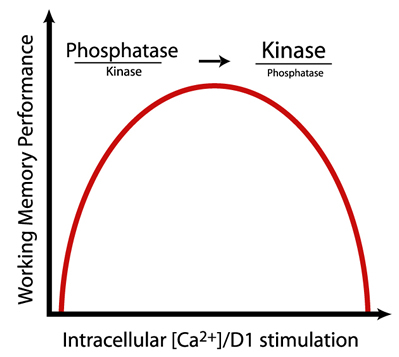Mechanisms Underlying Working Memory
| Select a project below to learn more: |
|
| Mechanisms Underlying Working Memory |
|
 Working memory requires the active maintenance of information over a brief time period in order to manipulate this information to guide a goal-orientated behavior. This type of memory is not only required for day-to-day activities, but also for high-level cognitive functions such as reasoning and decision making. Working memory function has been shown to be disrupted by several neurodegenerative diseases (including Alzheimer’s Disease, Parkinson’s Disease, schizophrenia, dementia, etc) and traumatic brain injury. The prefrontal cortex (the dorsolateral prefrontal cortex in humans and the medial prefrontal cortex in rodents) has been shown to be critical for working memory. Our work has demonstrated that while working memory requires calcium-dependent protein phosphatase activity, and protein kinases impair this function. These mechanisms appear to be disparate from that seen in short- and long-term memory formation (see below), and indicates that working memory is not simply a shorter version of short-term memory. We are currently investigating protein substrates that are modified by working memory.
Working memory requires the active maintenance of information over a brief time period in order to manipulate this information to guide a goal-orientated behavior. This type of memory is not only required for day-to-day activities, but also for high-level cognitive functions such as reasoning and decision making. Working memory function has been shown to be disrupted by several neurodegenerative diseases (including Alzheimer’s Disease, Parkinson’s Disease, schizophrenia, dementia, etc) and traumatic brain injury. The prefrontal cortex (the dorsolateral prefrontal cortex in humans and the medial prefrontal cortex in rodents) has been shown to be critical for working memory. Our work has demonstrated that while working memory requires calcium-dependent protein phosphatase activity, and protein kinases impair this function. These mechanisms appear to be disparate from that seen in short- and long-term memory formation (see below), and indicates that working memory is not simply a shorter version of short-term memory. We are currently investigating protein substrates that are modified by working memory.
